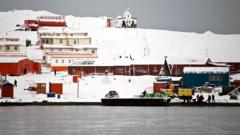The recent agreement granting Mauritian sovereignty over the Chagos Islands is hailed as a significant victory, especially for the displaced islanders, according to Pope Leo XIV. In a meeting with Chagos refugee representatives, he expressed hope for their eventual return, while the UK government faces criticism.
UK's Chagos Islands Agreement Viewed as Milestone by Pope

UK's Chagos Islands Agreement Viewed as Milestone by Pope
Pope Leo XIV heralds UK-Mauritius treaty as a breakthrough in the Chagos Islands situation, urging support for returning refugees.
The Pope's Remarks on Justice
Pope Leo XIV met with a group of 15 Chagos refugees in Vatican City, expressing delight over the recent UK-Mauritius treaty that transfers sovereignty of the Chagos Islands to Mauritius while allowing continued military operations by the US and UK on Diego Garcia for 99 years. The Pope characterized this transition as a "significant victory" in the refugees' long-standing effort to address what he termed a "grave injustice."
Under the treaty finalized in May, the UK will compensate Mauritius approximately £101 million annually for 99 years. This arrangement also establishes a 24-mile protected zone around Diego Garcia, prohibiting construction without UK consent. The treaty awaits ratification by both the UK and Mauritian parliaments to take effect.
Historically Controversial Background
The Chagos Islands were ceded to the UK in 1965, allegedly under duress in exchange for Mauritius’s independence. Following this arrangement, the islands were cleared to establish a military base, resulting in the forced relocation of the Chagossian population predominantly to Mauritius and the Seychelles, or among the UK populace, particularly in Crawley.
Controversial Perspectives
While Pope Leo stressed the importance of respecting the refugees' rights and identities, UK opposition leads have voiced discontent, arguing that the deal undermines national security. Critiques from Conservative leaders described the agreement as “an act of national self-harm” amid concerns over China's growing influence.
On the contrary, Mauritian Attorney General Gavin Glover expressed joy over the treaty's outcome, commemorating it as the culmination of a 60-year struggle for sovereignty by the Mauritian government. However, obstacles remain, with legal challenges raised by two women seeking the right to return to Diego Garcia after the High Court dismissed their case.
In summary, while the Pope's endorsement of the treaty may be a source of hope for Chagossians, the complexities surrounding national security, international relations, and historical grievances continue to shape the dialogue around the Chagos Islands.
Pope Leo XIV met with a group of 15 Chagos refugees in Vatican City, expressing delight over the recent UK-Mauritius treaty that transfers sovereignty of the Chagos Islands to Mauritius while allowing continued military operations by the US and UK on Diego Garcia for 99 years. The Pope characterized this transition as a "significant victory" in the refugees' long-standing effort to address what he termed a "grave injustice."
Under the treaty finalized in May, the UK will compensate Mauritius approximately £101 million annually for 99 years. This arrangement also establishes a 24-mile protected zone around Diego Garcia, prohibiting construction without UK consent. The treaty awaits ratification by both the UK and Mauritian parliaments to take effect.
Historically Controversial Background
The Chagos Islands were ceded to the UK in 1965, allegedly under duress in exchange for Mauritius’s independence. Following this arrangement, the islands were cleared to establish a military base, resulting in the forced relocation of the Chagossian population predominantly to Mauritius and the Seychelles, or among the UK populace, particularly in Crawley.
Controversial Perspectives
While Pope Leo stressed the importance of respecting the refugees' rights and identities, UK opposition leads have voiced discontent, arguing that the deal undermines national security. Critiques from Conservative leaders described the agreement as “an act of national self-harm” amid concerns over China's growing influence.
On the contrary, Mauritian Attorney General Gavin Glover expressed joy over the treaty's outcome, commemorating it as the culmination of a 60-year struggle for sovereignty by the Mauritian government. However, obstacles remain, with legal challenges raised by two women seeking the right to return to Diego Garcia after the High Court dismissed their case.
In summary, while the Pope's endorsement of the treaty may be a source of hope for Chagossians, the complexities surrounding national security, international relations, and historical grievances continue to shape the dialogue around the Chagos Islands.






















